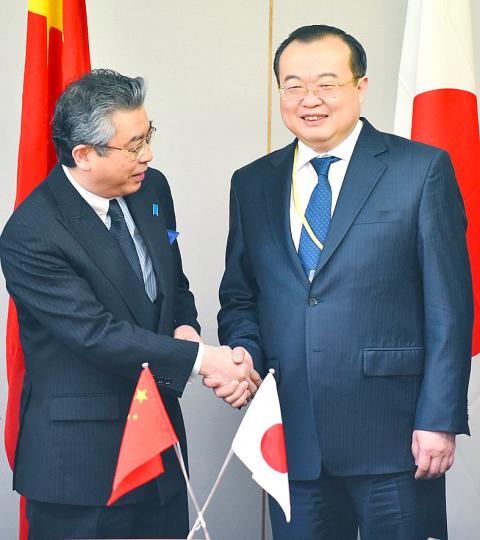Japan and China held security talks yesterday after a four-year hiatus because of simmering territorial tensions, in a meeting expected to touch on the flashpoint issue of maritime crisis management, officials and reports said.
The first such dialogue between the two Asian rivals since January 2011 was held at the Japanese Ministry of Foreign Affairs in Tokyo, a government official said, in the latest sign of a hastening thaw in once-frozen relations.
The talks involved top officials from each nation’s foreign and defense ministries, including Japanese Deputy Minister of Foreign Affairs Shinsuke Sugiyama and Chinese Assistant Minister of Foreign Affairs Liu Jianchao (劉建超).

Photo: AFP
Tokyo and Beijing are at loggerheads over the sovereignty of uninhabited islands in the East China Sea, which Japan administers as the Senkakus, but which Taiwan and China claim as the Diaoyutai Islands (釣魚台).
Relations soured in 2012 when the Japanese government angered China by nationalizing three of the five islands and Beijing had since refused most high-level talks with Tokyo, as ships and planes from both sides regularly sparred in the East China Sea.
Some observers had warned that the regular presence of military or paramilitary vessels from two of the region’s biggest powers risked sliding into conflict through error or a wayward local commander, but the two sides broke the ice in November last year when Japanese Prime Minister Shinzo Abe and Chinese President Xi Jinping (習近平) exchanged a frosty handshake on the sidelines of an APEC forum.
“Our country sees [the dialogue] as important as it is expected to improve mutual trust between Japan and China in the field of security,” Japanese Chief Cabinet Secretary Yoshihide Suga told reporters. “Through this dialogue, we want to foster a sense of trust between the two countries by exchanging views frankly and honestly on security policies, defense policies and the regional situation.”
Liu told the meeting that Beijing hoped to develop ties with Tokyo in the spirit of “taking history as a mirror and looking forward to the future,” Xinhua news agency said.
The comment reflects Beijing’s persistent theme of Japan’s need to face up to its actions in World War II.
Japan was expected to ask China to go ahead with stalled plans to launch a maritime crisis-management mechanism as soon as possible, Jiji Press said.
Tokyo is also expected to ask Beijing to make its growing defense spending more transparent and explain the reasons behind its military expansion, it said.
Beijing was likely to want to talk about moves by Abe to relax restrictions on the Japanese military to allow it to come to the aid of allies under attack, it added.

‘TAIWAN-FRIENDLY’: The last time the Web site fact sheet removed the lines on the US not supporting Taiwanese independence was during the Biden administration in 2022 The US Department of State has removed a statement on its Web site that it does not support Taiwanese independence, among changes that the Taiwanese government praised yesterday as supporting Taiwan. The Taiwan-US relations fact sheet, produced by the department’s Bureau of East Asian and Pacific Affairs, previously stated that the US opposes “any unilateral changes to the status quo from either side; we do not support Taiwan independence; and we expect cross-strait differences to be resolved by peaceful means.” In the updated version published on Thursday, the line stating that the US does not support Taiwanese independence had been removed. The updated

‘CORRECT IDENTIFICATION’: Beginning in May, Taiwanese married to Japanese can register their home country as Taiwan in their spouse’s family record, ‘Nikkei Asia’ said The government yesterday thanked Japan for revising rules that would allow Taiwanese nationals married to Japanese citizens to list their home country as “Taiwan” in the official family record database. At present, Taiwanese have to select “China.” Minister of Foreign Affairs Lin Chia-lung (林佳龍) said the new rule, set to be implemented in May, would now “correctly” identify Taiwanese in Japan and help protect their rights, the Ministry of Foreign Affairs said in a statement. The statement was released after Nikkei Asia reported the new policy earlier yesterday. The name and nationality of a non-Japanese person marrying a Japanese national is added to the

AT RISK: The council reiterated that people should seriously consider the necessity of visiting China, after Beijing passed 22 guidelines to punish ‘die-hard’ separatists The Mainland Affairs Council (MAC) has since Jan. 1 last year received 65 petitions regarding Taiwanese who were interrogated or detained in China, MAC Minister Chiu Chui-cheng (邱垂正) said yesterday. Fifty-two either went missing or had their personal freedoms restricted, with some put in criminal detention, while 13 were interrogated and temporarily detained, he said in a radio interview. On June 21 last year, China announced 22 guidelines to punish “die-hard Taiwanese independence separatists,” allowing Chinese courts to try people in absentia. The guidelines are uncivilized and inhumane, allowing Beijing to seize assets and issue the death penalty, with no regard for potential

‘UNITED FRONT’ FRONTS: Barring contact with Huaqiao and Jinan universities is needed to stop China targeting Taiwanese students, the education minister said Taiwan has blacklisted two Chinese universities from conducting academic exchange programs in the nation after reports that the institutes are arms of Beijing’s United Front Work Department, Minister of Education Cheng Ying-yao (鄭英耀) said in an exclusive interview with the Chinese-language Liberty Times (the Taipei Times’ sister paper) published yesterday. China’s Huaqiao University in Xiamen and Quanzhou, as well as Jinan University in Guangzhou, which have 600 and 1,500 Taiwanese on their rolls respectively, are under direct control of the Chinese government’s political warfare branch, Cheng said, citing reports by national security officials. A comprehensive ban on Taiwanese institutions collaborating or